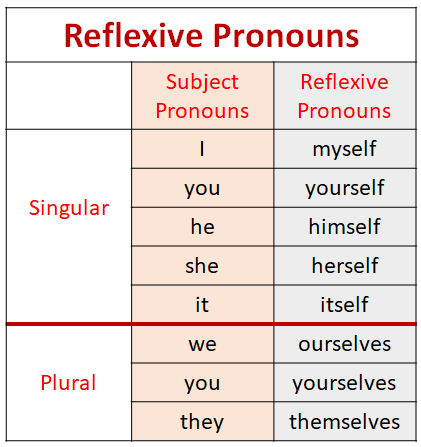Reflexive Pronouns
Related Pages
Types of Pronouns
Personal Pronouns
Subject Pronouns, Object Pronouns, Reflexive Pronouns
Possessive Pronouns
More Lessons On English Grammar
More Lessons for English as a Second Language
Welcome to our collection of English as a Second Language (ESL) tools & resources for students, teachers, and educators. We have lots of free videos that will help you improve your English and also advice and tips that will help you in English proficiency examinations like TOEFL and IELTS.
A pronoun is a word that takes the place of a common noun or a proper noun.
A reflexive pronoun is a pronoun that is usually used when the object of a sentence is the same as the subject. Each subject pronoun (such as I, you, he, she, it, we and they) has its own reflexive form.
The reflexive pronouns are:
myself, yourself, himself, herself, itself, ourselves, yourselves, themselves.
The following diagram shows examples of reflexive pronouns. Scroll down the page for more examples of reflexive pronouns.

How and When to Use Reflexive Pronouns:.
-
When the subject and object in a sentence are the same.
Examples:
You are not to blame yourself. (subject is you, object is yourself)
The cat scratched itself. (subject is cat, object is itself)
You can come in and find yourselves a seat. (subject is you, object is yourselves) -
As the object of a preposition, when the subject and the object are the same.
He will go home by himself. (subject is he, object is himself, preposition is by)
Susan is looking at herself in the mirror. (subject is Susan, object is herself, preposition is at)
We completed the assignment all by ourselves. (subject is we, object is ourselves, preposition is by)
The noisy students draw attention to themselves. (subject is students, object is themselves, preposition is to) -
When you want to emphasize the subject.
I baked this myself. (no one else helped me)
He ate the pizza himself. (no one else had any)
Reflexive Pronouns
Reflexive pronouns refer the reader or listener back to the subject.
For example: “She looked at herself in the mirror. They gave themselves a lot of time to finish the work."
Watch the following video for a lesson on reflexive pronouns.
Singular |
Subject Pronoun |
Reflexive Pronoun |
I |
myself |
|
you |
yourself |
|
he |
himself |
|
she |
herself |
|
it |
itself |
|
Plural |
you |
yourselves |
we |
ourselves |
|
they |
themselves |
Common Mistakes and Important Rules:
Do NOT use reflexive pronouns when a regular object pronoun is needed:
Incorrect: John gave the book to myself.
Correct: John gave the book to me. (The action is on “me,” but “me” is not the subject, so it’s not reflexive.)
Incorrect: Sarah and myself are going to the concert.
Correct: Sarah and I are going to the concert. (The reflexive pronoun cannot be the subject of a sentence.)
Avoid using incorrect forms:
Incorrect: hisself (The correct form is himself)
Incorrect: theirselves (The correct form is themselves)
Incorrect: ourself (The correct form is ourselves)
Some verbs typically do not take a reflexive pronoun when the action is routinely done to oneself:
Verbs like wash, dress, shave, feel, relax, concentrate, hurry, comb, get up, sit down are generally not used with reflexive pronouns when the subject is performing the action on themselves as a normal part of their routine.
Correct: I washed before dinner. (Not “I washed myself before dinner.”)
Correct: She dressed quickly. (Not “She dressed herself quickly.”)
Correct: He feels good. (Not “He feels himself good.”)
However, if the action is unusual or emphatic, a reflexive pronoun can be used:
He hurt himself while playing. (This is not a routine action.)
She taught herself to code. (This is a specific, self-directed action.)
Understanding when the subject and object are the same, and when emphasis is intended, is key to correctly using reflexive pronouns.
Try out our new and fun Fraction Concoction Game.
Add and subtract fractions to make exciting fraction concoctions following a recipe. There are four levels of difficulty: Easy, medium, hard and insane. Practice the basics of fraction addition and subtraction or challenge yourself with the insane level.

We welcome your feedback, comments and questions about this site or page. Please submit your feedback or enquiries via our Feedback page.